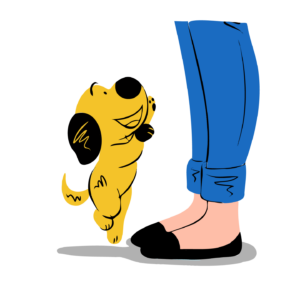Pets and Their People Blog
Trigger Stacking in Pets Explained
The holidays, a busy time of year, are quickly approaching! This time of year can be stressful for everyone, including our pets.
Your home may undergo many changes, including decorating and adding a tree that may be so tempting for cats to climb or dogs to chew on! Not only that, but we’ll also have a lot of visitors and people coming and going, which can all contribute to trigger stacking, but what exactly is trigger stacking?
When a series of minor incidents pile up to the point where your pet can no longer handle them and has what we might call an overreaction, this is known as trigger stacking.
These little things are what we refer to as stressors or triggers. They might not seem like much to us, and we often don’t even notice that our pet might be uncomfortable. However, for our pets, continuing to feel stressed prevents them from decompressing and leads to a feeling of overwhelm.
To better understand how our pets feel, let’s look at trigger stacking from a human perspective:
- You wake up in the morning and go to the kitchen to make breakfast – your partner/kids have drunk all of the milk for your morning coffee – URGH, annoying!
- You drive to work and stop off at a cafe, then someone cuts in front of you in the queue – rude!
- You get to work and realize in your decaffeinated haze you forgot to pick up your lunch – you feel frustrated.
- Someone at work is unkind to you – you cry in the toilet.
You get through your working day, and you are spent. This day has really got on your nerves.
- You arrive home, and your partner says the internet has gone down – you can’t take it anymore!!
You get on the phone and unleash your inner rage at the poor customer service agent on the other end – you wouldn’t normally speak to someone this way, so why have you exploded?
Well, you’ve been trigger stacking all day, and this reaction is very similar to what happens to your pet.

In our dogs and cats, common triggers or stressors can look like this:
- You’re rushing around cleaning the house.
- The vacuum cleaner is going, and your pet doesn’t like the noise.
- You keep shooing your cat or dog out of the way.
- People arrive, and the doorbell keeps going off. There’s a lot of noise.
- You’re trying to stop your dog from barking at the door or rushing up to guests to see who they are.
- People your pets don’t know, try and stroke them, perhaps even pick your cat up!
- Children are running around, making strange noises and maybe screaming.
- A guest might have even brought their own dog – your dog usually likes them. Why are they acting up now?
- You’ve made a long journey in the car and are bringing your dog into a new environment.
Can you see how any of these triggers, taken separately, might be reasonable but, taken together, might be too much for your pet?
The holidays can be very stressful for us and our pets. In puppies or kittens, they may not have been in their new home for very long, so they have a lot of adjustments to make and may also be going through a fear period. Eeek!
How to Avoid Trigger Stacking This Holiday Season
- Prepare ahead of time, so you aren’t rushing around and cleaning right before your guests arrive.
- Before guests come, take your dog for a walk to ensure they are relaxed and not full of pent-up energy.
- If you have a reactive dog, try to plan this walking route away from things you know will stress them out, use lots of treats, and train them when you take them for a walk.
- Make every effort to manage the environment, such as having a cat-safe or dog-only area where they can get away from your guests or their dogs or where you can put them safely away and make that choice for them.
- Use a playpen or crate for your puppy to give them a chill-out zone.
- Ask guests to ignore your pets, especially puppies and kittens. Give your pets the choice to interact if they want to.
- If you’re going somewhere new, take your dog for a short walk when you arrive.
- If your host has a resident dog, or your guest is bringing a dog, get them used to each other on neutral territory before bringing them both into the house. That way, neither dog will feel threatened by the newbie!
Enjoy the holidays, and remember how your pets may feel and plan accordingly to keep them from feeling overwhelmed.
About the Author
Petrina Firth is a Dog Trainer and Certified Animal Behaviorist of over 10 years who now mainly specializes in Separation Anxiety (CSAT) and also creates content, lessons and articles for the Zigzag puppy training app and website. Petrina is a member of the Pet Professional Guild, the head of marketing and board member for the APDT UK, and a member of the CAPBT committee. She is also a tech and gadget enthusiast who enjoys city living with her rescue French Bulldog and partner.

* Available in the UK and coming soon to the US.
Zigzag is a Pet Professional Guild Corporate Partner.
